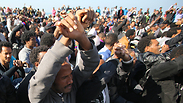
Asylum seekers protest in Tel Aviv. 'Intimidated, but not scared'
צילום: ירון ברנר
A lesson in solidarity
Op-ed: Israelis should learn from African asylum seekers how to stand up courageously for their human rights
No matter what you think about the status of the Africans – refugees, asylum seekers, migrants or infiltrators – the lesson in solidarity which they have been teaching us in recent weeks, in the ways of a courageous and non-violent struggle for human rights, is fitting and important for us Israelis to internalize.
For those of us with a short memory, the renewed protest for social justice was crushed through violence used by the police and Border Guard forces, and through personal documentation of the citizens arriving to protest. At first, in light of the physical danger and the unwillingness to expose children to expressions of violence, the parents and children – the civil core for which the protest was started – backed out. They were followed by many others, because it's very hard to go out to the public space, knowing that you will be faced by organized forces which can physically harm you or jail you even when your protest lacks any expression of violence. We were intimidated and we got scared, and we dispersed.
We were educated to be law-abiding citizens, and we were not educated on the possibility that those in charge of upholding the law will rise up against us, hit us and persecute us. The democratic tradition in Israel is too young, its studying and discourse are too limited, and therefore the cognitive burn achieved by using violence against protesting citizens easily won over the burning of democratic cognition.
The public revival of the summer of 2011 was replaced with silence and paralysis, which allowed the government and Knesset to abolish the promises given for a change in the list of priorities and increase the crushing of human rights. We were weakened, and imprisoned in our homes. And here comes a group of people, the weakest of the weak, and teaches us a lesson in visibility and in insisting on human rights.
It began with the march to Jerusalem of the prisoners from the new jail opened in the Negev. The marchers knew in advance that they had no chance against the armed forces facing them, even though they did not violate any law by leaving the facility defined as open. They knew they would pay a costly personal price, and were indeed jailed as a punishment in the Saharonim Prison, and yet chose to take advantage of their rare hours of freedom not in order to escape or hide, not in order to replace the prison with a prison of living in gear, but in order to march, to be seen, to be heard. And this continued with protests in Tel Aviv and in Eilat, of thousands, with their women and children, who are aware of the fact that every exit to the public space involves a physical threat and a threat to their freedom.
All the protests were organized by the community itself. Those pointing a finger at the organizations helping the asylum seekers, and accusing them of leading the protest, are knowingly misleading us. And those who witnessed these protests, from the quiet and noble gathering of thousands at the Lewinsky Garden, through their complete obedience to the ushers on behalf of the community, to the marching of masses on the street and the mass gathering at Rabin Square, could not avoid being envious of this show of democratic humanity and of the awareness of the freedom to insist on human rights which emerged from it. Intimidated, but not scared.
Put yourselves in their place for a moment. Replace their marking as "black" and "criminals" with your marking by the State as "criminal" protestors. Put yourselves in the place of the mothers and children whose fathers are torn away from them in the heart of the street, arrested and jailed for an unknown period of time, in the place of the men, some of whom are actually youth, who go on the street every morning without knowing whether they will return. In the place of all those whose fate and ability to exist completely depends on the authorities and their bureaucracy.
Would you, Israelis, the so-called landlords of the public space, find the courage to go out and protest in masses? Would you put yourself in danger, with your women and children, in order to insist on your human rights, to stand up publicly and force those controlling your fate to see and hear you?










